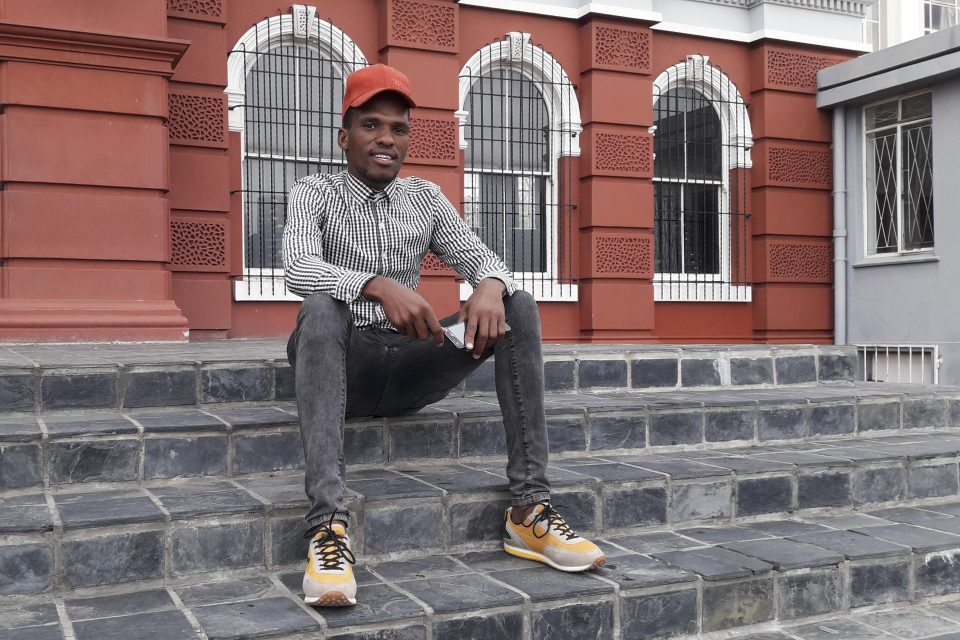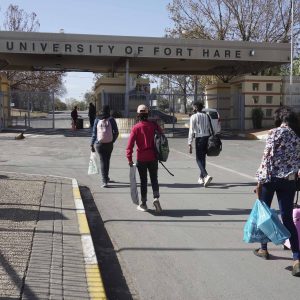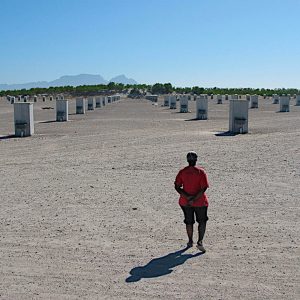Student leader faces prison for his activism
Sabelo Madlala has left his TVET college with a criminal record instead of a diploma, after being criminalised for taking up the grievances of students in Makhanda.
Author:
8 September 2020

A student leader is disillusioned with the government and justice system after his technical and vocational education and training (TVET) college used public funds to pay for three costly high court cases against him, resulting in a prison sentence.
Sabelo Madlala, 27, a former student representative council (SRC) president at Eastcape Midlands College in Makhanda, was first handed a wide-ranging interim interdict on 14 October 2019. The Makhanda high court banned Madlala, the other seven members of the SRC, all Eastcape Midlands College students and anyone associated with the students from damaging property, threatening college staff members and blocking the college’s entrances and exits.
While these are common clauses in an interdict against student protests, the huge group was also banned from a number of other activities that are not illegal, such as interfering with the “psychological and mental wellbeing” of the college staff. There are two clauses in the interdict that prevent the students from expressing themselves freely. They are banned from posting any derogatory and untrue social media messages about the college and from “acting in any manner which occasions any unlawful damage to the college’s reputation”.
The court action by the college followed several months of peaceful protests in 2019 by students who said they had not received their National Student Financial Aid Scheme living allowances for months, that they were forced to work in outdated laboratories and that they were not provided with protective gear when doing tasks such as welding. Dozens of parents hitchhiked from around the Eastern Cape to the Makhanda campus, demanding to know why the college had not paid the students their allowances. And the college suspended an economics lecturer and banned him from talking to the media after a video circulated of him expressing support for the students.
Related article:
The students say that with no legal support from the national office of the South African Students Congress (Sasco), they had no way to fend off the interdict. The students stayed away from the hearing, saying there was no point in going to court without a lawyer. Judge Steven Gough granted the college a final interdict in the Makhanda high court on 7 November 2019, on the basis of an affidavit from the college stating that although there had been no protests after the interim interdict was granted, there was a likelihood that students and the SRC would disrupt end-of-year exams.
Singled out
The interdict specifically bars Madlala and the SRC from disrupting lessons.
“I stayed away from the students after being interdicted, even though I am their elected leader. At the beginning of 2020, they were protesting peacefully outside the college and called me to address them. The interdict does not prevent me from doing that, but a few days later I was charged with contempt of court,” said Madlala. He was the only person charged with this offence, despite the interdict also applying to the SRC, students and their supporters.
Madlala had to represent himself in the Makhanda high court in August on the contempt of court charge, after Legal Aid withdrew from representing him. The outcome was a sentence of three months in prison, suspended for three years, and a costs order against him. Madlala, who was refused registration by the college this year without any reason provided, is still waiting to hear how much these costs are. They are likely to run into tens of thousands of rands, which the unemployed student leader does not have.
Legal Aid spokesperson Siphokazi Nogaya said the organisation withdrew from the case because Madlala had missed appointments with them. But Madlala said that after his first meeting with Legal Aid, his attorney refused to give him her contact details, saying she would phone him if she needed further information. He says the Legal Aid landline number went unanswered during lockdown and his emails bounced back. Legal Aid could not provide New Frame with proof that it had scheduled appointments with Madlala or sent him any emails.
Related article:
“Legal Aid disappointed me and they dragged me to hell. I had started online crowdfunding for a lawyer to represent me on the contempt of court charge. I cancelled it when Legal Aid promised to represent me because it would not have been right to ask fellow students for money while I had a lawyer. But then Legal Aid dropped me, so I have to start my fundraiser once again to raise funds to appeal my conviction. It has been very difficult,” said Madlala.
It is unclear why the Eastcape Midlands College chooses to suspend classes when there are student protests. The college has a relatively small number of students who protest outside the campus in groups of less than 100 for a few hours at a time, unlike students at big universities who hold protests with several thousand people and blockade university entrances for days.
College principal Charl van Heerden said, “College management will at all times place the safety of students above all else. Should a situation arise where students’ safety is potentially compromised, management will take whatever steps it deems necessary to ensure their safety.”
Sugar meme
Madlala said the college’s management wants student leaders it can wine and dine in hotels and resorts, not activists who try to solve genuine problems. He said he was expelled at the end of last year for alleging that there were corrupt practices at the institution, such as misspent money and the alleged appointment of unqualified staff. He also circulated a meme that became popular among the students, depicting 1kg bags of sugar that the college said it had bought for R50 when the retail price is less than R20.
Van Heerden would not say why Madlala was expelled. “Expulsion brings to an end the relationship with a student and the college. This is not only for a specific year but remains in place, unless a specific application, by a student, is made to set aside his or her expulsion,” he said.
Related article:
The Department of Higher Education, Science and Technology funds South Africa’s 50 TVET colleges. But spokesperson Ishmael Mnisi did not respond when asked if the department performs any oversight over the amount of money TVET colleges spend on crowd-control security and legal fees in cases against protesting students.
Right2Protest project coordinator Busisiwe Zasekhaya and attorney Thandeka Kathi, both from the University of the Witwatersrand’s Centre for Applied Legal Studies, said “interdicts should be specific, because the broader they are, then the greater the risk of infringing on constitutional rights”.
While universities and colleges have the right to seek interdicts against unlawful protests, “it could be considered as a breach of the right to protest. The continued use of interdicts barring students from exercising their constitutional right to protest is quite problematic, because we have seen how these interdicts have been used to suppress dissent,” they said.
“Students have the right to be on campus and to voice their dissent. It is also important to note that universities are essentially an organ of the state, therefore they have an added responsibility to ensure that they safeguard constitutional rights.”
The college denied that it was misusing the interdict to clamp down on peaceful protests. “That is an unfortunate accusation disguised as a question … The college is prepared to accept any lawful activities by its students. It will, however, not tolerate any form of unlawful conduct,” said Van Heerden.
He added that it was untrue that Madlala had been charged with contempt of court for making a speech. “Part of the order or interdict was that students may not publish any disparaging remarks about the college. Mr Madlala failed to heed the interdict, breached the court order and published on WhatsApp a number of allegations which were dishonest, misleading, defamatory and inciting. Given this publication, the college brought an application of contempt against Mr Madlala.”
Van Heerden did not supply New Frame with the messages and reiterated only that Madlala had “published unacceptable WhatsApp messages”.
The interdict seems to have been an easier mechanism by which to silence Madlala than a defamation lawsuit. Madlala said he suspects that the national government condones the Eastcape Midlands College action against him as they have not responded to his calls for assistance. “I am a loyal member, still representing Sasco and the ANC, but now I can’t even go and apply for a job because the institution is holding my results,” he said.
The student leader is now paying a high price for his activism. He left college with a criminal record instead of a qualification, and with a costs order against him that he said may destroy his credit record for the next 20 years, if not forever.
Van Heerden confirmed that the college is planning to retrieve all its legal costs from Madlala. “The court has granted a costs order against Mr Madlala. Courts grant costs orders to reimburse the successful party its cost because the unsuccessful party was unable to persuade the court that their case had any merit. The college sees no reason why it should not pursue the costs order and has instructed its attorneys to do so.”



